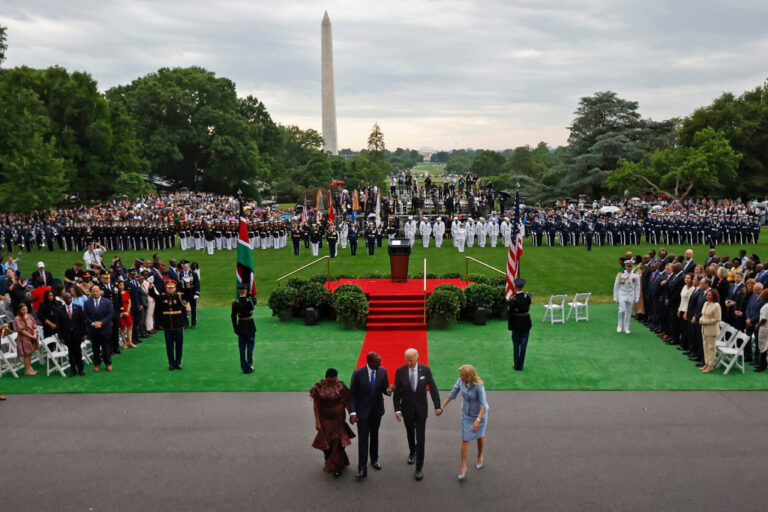ANALYSIS — President Joe Biden on Thursday praised his 60-year-old business and political partnership with Kenya as he seeks to shore up a key ally seen as a buffer against Chinese and Russian influence in Africa.
At an elaborate welcoming ceremony on the South Lawn of the White House, the two leaders toured U.S. military troops and praised Kenyan President William Ruto for his cooperation in combating violent extremist groups such as ISIS and al-Shabaab, as well as measures to curb the impact of climate change. But as in Wednesday’s more informal meeting, the U.S. president made clear that deepening business ties between the two countries was perhaps the biggest focus of his state visit.
“Today, as we launch the next decade of our partnership, we launched a new effort to bring our two countries, our companies and our communities closer together,” Biden said, “because history has shown that when Kenya and the United States work together, we are stronger and the world is safer.”
The ceremony marks the beginning of the first official visit by an African leader in nearly 20 years. The last time it was held in September 2008 during President George W. Bush’s second term, with John Kufuor of Ghana.
U.S. officials believe Kenya has economic and political buffers against the growing influence of China and Russia in East Africa. Biden is scheduled to host Ruto and other Kenyan officials at a state dinner Thursday night on the South Lawn of the White House, with more than 1,000 candles and views of the Washington Monument. Menu items include cold green tomato soup and beef short ribs. Lobster and banana ganache.

The two leaders discussed a range of issues during two days of talks at the Presidential Villa, including a roundtable with business leaders on Wednesday, during which the US President touched on the history of US-Kenya relations and said, “Nowhere is this more important than in the area of innovation. That’s why we have so many business leaders gathered around this table.”
Biden said Wednesday that if re-elected this year, he would fulfill his 2020 campaign promise to visit Africa. “If I am re-elected, I plan to visit in February,” he told reporters.
Here are three other takeaways from Biden and Ruto’s meeting and joint press conference.
“Dealing with debt”
White House officials said this week that many of the new business deals between the two countries should be signed in the coming months. Perhaps the most notable announcement, a “deliverable” as it’s known in diplomatic circles, was Biden’s announcement of a new joint effort to help developing countries deal with mounting debt.
“We have to deal with debt before we deal with growth,” Biden said near the end of a joint news conference.
Biden announced that the United States plans to send $21 billion to the International Monetary Fund’s Poverty Reduction and Growth Fund to help those countries, and said an additional $250 million in U.S. funding will help the World Bank respond to the global crisis.
On anticipated business deals, the two leaders welcomed that negotiations are underway for several joint economic and investment agreements, saying officials are on track to finalize a deal by the end of this year. Ta. Additionally, the leaders noted that major US companies such as Coca-Cola are investing in Kenya.
The US International Development Finance Corporation has announced a number of grants and loans to Kenyan companies, including those specializing in areas such as healthcare, electric vehicles, auto finance and weather forecasting.
“It’s against our interests.”
On the upcoming Kenya-led mission to combat gang warfare in Haiti, Ruto faced perhaps the most difficult question during a press conference. A Kenyan reporter wonders how he can justify sending Kenyan police and security forces to faraway countries and spending money while some schools in his home country remain closed. We crowded together.
Ruto argued that Kenya had a “responsibility” to help.
Biden was asked why he chose not to send U.S. troops to bring stability to the Caribbean. Biden responded that doing so would raise too much skepticism about Washington’s true intentions and that such a deployment would be “against the interests of Haiti and the United States.”
In return, Biden reiterated that the United States would provide logistics and intelligence support to the Kenyan-led security forces, as well as unspecified “materials.” He said sending “thousands” of Western troops would not solve Haiti’s problems.
“Great political value”
As China and Russia have expanded their business and political dealings across Africa in recent years, U.S. officials see Kenya and Ruto as key to countering Beijing and Moscow’s influence.
Biden administration officials are reportedly considering formally designating Kenya a “major non-NATO ally,” though the U.S. president did not announce such a move on Thursday. Still, analysts say there were a number of strategic reasons to give Ruto the full state visit money.
In addition to the country’s buffer status against China and Russia, “there is also an offer for Ruto to lead a multinational peace effort to Haiti, a crisis that Washington is very uncomfortable with but has been reluctant to get directly involved in. This is undoubtedly the main reason for the warm welcome Ruto has received,” said Matt Ward, a former U.N. official and now an analyst at Oxford Analytica.
Regarding efforts in Haiti, Biden said, “It really matters whether Kenya is willing to take a leading role on this.”
Undoubtedly, Mr. Root himself was further elevated among world leaders by the warm welcome he received at the White House, with the flag hanging on a Pennsylvania Avenue lamppost and reporters addressing him from the podium. It will be.
“This has enormous political value for Kenya and Ruto,” Ward added in the report on Thursday. “More importantly, it may represent an opportunity to attract new U.S. investment, a key pillar of Ruto’s economic policy, which would bring welcome relief to the economy.”
Author’s note: FiscalNote is the parent company of CQ Roll Call and Oxford Analytica.

